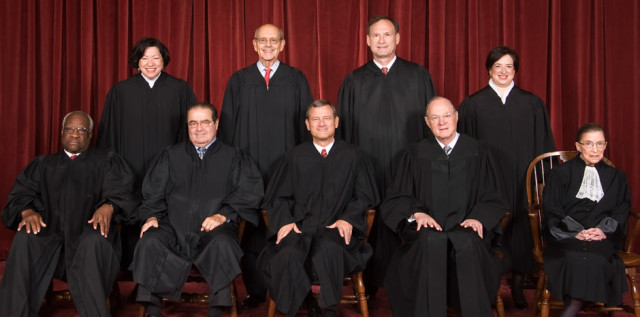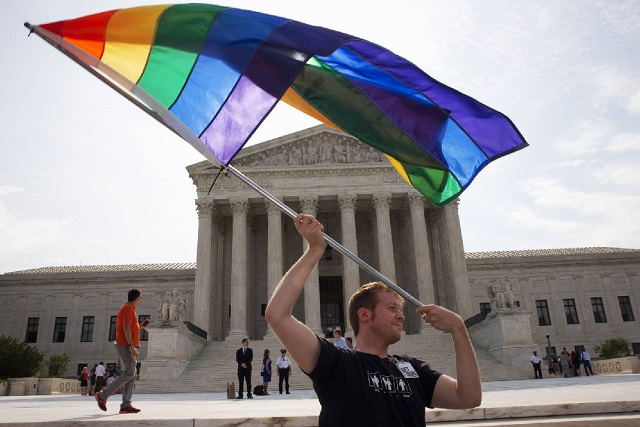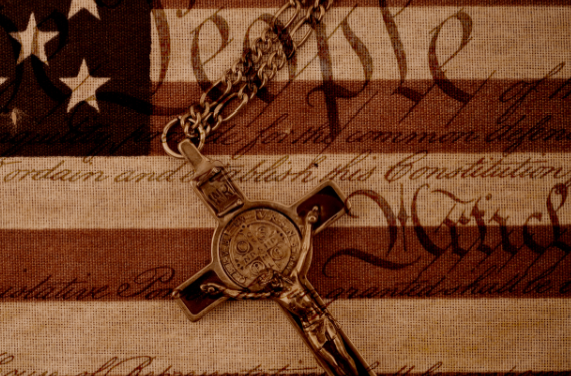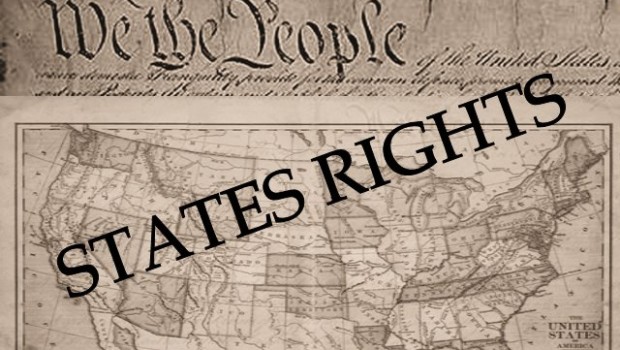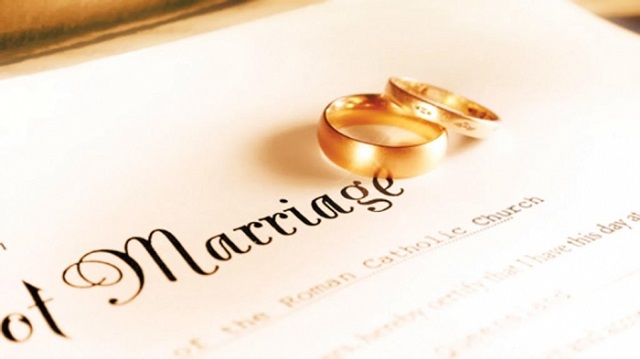Throughout the recorded history of mankind, there is no record of any culture having recognized same-sex marriages. It is astounding that five persons in black robes sitting in Washington D.C. can overturn millennia of marriage customs with the stroke of a pen or with fingers on a keyboard.
Not only do they find same-sex marriage permissible under the United States Constitution, but they impose upon the entire country a mandate based upon the 14th Amendment, adopted nearly 150 years ago primarily to protect former slaves in former Confederate states. No framer ever conceived that the Constitution could be so used to twist the institution of marriage.
I begin with the Bible, but I end with secular law.
For Christians and Jews, the Bible could not be clearer. Homosexual sex is a sin. God destroyedSodom and Gomorrah, which were described in Romans 1:26-27 as steeped in sinful homosexual activity.
In 1 Cor. 6:9, Paul writes : “Do you not know that the unrighteous will not inherit the kingdom of God? Do not be deceived. Neither fornicators, nor idolaters, nor adulterers, nor homosexuals,[a] nor sodomites … ”
: “Do you not know that the unrighteous will not inherit the kingdom of God? Do not be deceived. Neither fornicators, nor idolaters, nor adulterers, nor homosexuals,[a] nor sodomites … ”
And in 1 Cor. 7:2: “Nevertheless, because of sexual immorality, let each man have his own wife, and let each woman have her own husband.”
Still, Paul also said in 1 Cor. 5:9-10 (NKJV):
I wrote to you in my epistle not to keep company with sexually immoral people.
Yet I certainly did not mean with the sexually immoral people of the world, or with the covetous, or extortioners, or idolaters, since you would need to go out of the world.
Paul recognizes that Christians will keep company with the sexually immoral outside the church, because the world is full of the sexually immoral. Paul does not advocate the persecution of same-sex relationships, but neither does he approve their celebration.
So that is the Bible’s take. What about secular law? Here we have five Supreme Court justices creating a right to state licensure of behavior that mankind, over the millennia, has deemed to be sexually immoral.
Which brings us to the case of Kim Davis. Kim Davis is an elected county clerk for Rowan County, Kentucky. As county clerk, she issues marriage licenses. Her name goes on each license her office issues. When she was elected to the job, Kentucky law authorized marriage licenses only to opposite-sex couples: one man, one woman.
On June 26, 2015, five of the nine Supreme Court justices turned the Christian world upside down in the case Obergefell v. Hodges, holding that the 14th Amendment requires the states to issue licenses for the marriage of two people of the same sex. The plaintiffs in the case brought suit in Michigan, Kentucky, Ohio and Tennessee, claiming that those states violated the 14th Amendment by denying homosexuals the right to marry each other or to have their marriages recognized when performed in other states.
Kim Davis was not a party to the Obergefell case, but the state of Kentucky was. The Supreme Court held, “The Constitution, however, does not permit the State to bar same-sex couples from marriage on the same terms as accorded to couples of the opposite sex.”
Immediately after the Obergefell decision, Kentucky Gov. Steve Beshear said, “Effective today, Kentucky will recognize as valid all same-sex marriages performed in other states and in Kentucky.” The Kentucky legislature has not changed the Kentucky statutes. Nor have the people of Kentucky amended their state constitution, which defines marriage as being between one man and one woman.
The Kentucky Constitution’s definition of marriage (passed with 75 percent of the vote in 2004) and the Kentucky statute defining marriage as being between one man and one woman were declared unconstitutional. It seems, therefore, that without an act of the Kentucky legislature, Kentucky has no marriage law for anyone, because its statutes are unconstitutional. Kim Davis viewed it exactly that way. After the Obergefell decision, she decided that her office would issue no marriage licenses to same-sex couples – or to anyone else.
On July 2, 2015, homosexual activists filed a class action complaint in the Eastern District of Kentucky against Kim Davis to force her to issue marriage licenses to same-sex couples. The plaintiffs requested that the court issue a preliminary injunction to force Davis to issue same-sex licenses.
Ms. Davis asserted her right to refuse to issue licenses based upon, among other things, the failure of the Kentucky legislature to act and the Kentucky Religious Freedom Restoration Act. Based uponObergefell, the U.S. district judge issued a preliminary injunction ordering Ms. Davis to issue marriage licenses to same-sex couples. When Ms. Davis refused to obey the preliminary injunction, the judge ordered her to jail. The judge released her only after her deputies promised to issue the licenses.
The remaining debate is over whether Ms. Davis, as a matter of conscience, has a right to refuse to issue marriage licenses that approve something the Bible condemns.
On one hand, Ms. Davis is a state official with a duty to follow the law as determined by the courts having jurisdiction, however ill-founded the law is. This side argues that her proper protest would be to resign rather than issue the license.
(In unrelated news, a Muslim flight attendant is fighting on religious-discrimination grounds the termination of her employment, after she refused to serve alcohol to passengers. She was not under a court order, so she is not going to jail, but she is not resigning either. Will there be consistency in the interpretation of religious conscience?)
On the other side of the debate is the duty of every citizen of conscience to disobey tyrannical laws that are offensive to the constitution as it is reasonably interpreted and understood, notwithstanding any twisting of meaning by five black-robed justices. If public officials must resign rather than disobey laws that are wrong, their positions will be filled by people without the conscience necessary to right these wrongs. And with these people in office, the wrongs will stick around.
Before the Civil War, the state of Wisconsin refused to obey the Fugitive Slave Act. Any state officer was barred from assisting federal officials in the return of escaped slaves. More recently, Washington, California, and Colorado are thumbing their noses at federal drug laws relating to marijuana. The states could simply refuse to obey the law and refuse to appear in federal courts on the subject. This is called “nullification” and is a response that the states can and should make to federal overreach. For more about this strategy, read Nullification by Thomas E. Woods, Jr.
Alas, according to the polls, it is a losing proposition in our secular culture to protect the definition of marriage as being between one man and one woman. More than half of all Americans approve of gay marriage. It is likely that the various legislatures and state constitutions would have eventually succumbed even without the Supreme Court, unless there were a serious religious revival in this country.
I salute Kim Davis, not for the rightness of her legal position, but because she stood up for her Christian beliefs to the extent of being willing to go to jail for them. In the Bible, Daniel refused to worship a statue and got himself thrown into the lion’s den for exercising his religious conscience. The black-robed five have made it perfectly clear that in their brave new world, traditional Christian morality and believing Christians are unwelcome.
 ABOUT DAVID CARROLL
ABOUT DAVID CARROLL
David Carroll is an Ohio lawyer who has been practicing for 39 years. His work has included public interest litigation defending Judeo-Christian values, and he has served as chairman of the board for Christian Action Network for over 20 years. Mr. Carroll graduated cum laude from Capital University Law School in Bexley, Ohio in 1976 and has practiced law in Ohio and Arizona.






 : “Do you not know that the unrighteous will not inherit the kingdom of God? Do not be deceived. Neither fornicators, nor idolaters, nor adulterers, nor homosexuals,[a] nor sodomites … ”
: “Do you not know that the unrighteous will not inherit the kingdom of God? Do not be deceived. Neither fornicators, nor idolaters, nor adulterers, nor homosexuals,[a] nor sodomites … ”

 ABOUT DAVID CARROLL
ABOUT DAVID CARROLL


 Dinesh D’Souza’s latest #1 New York Times best selling book is “America,” a rebuttal of the progressive shame narrative of American history, now available in paperback for the first time!
Dinesh D’Souza’s latest #1 New York Times best selling book is “America,” a rebuttal of the progressive shame narrative of American history, now available in paperback for the first time!